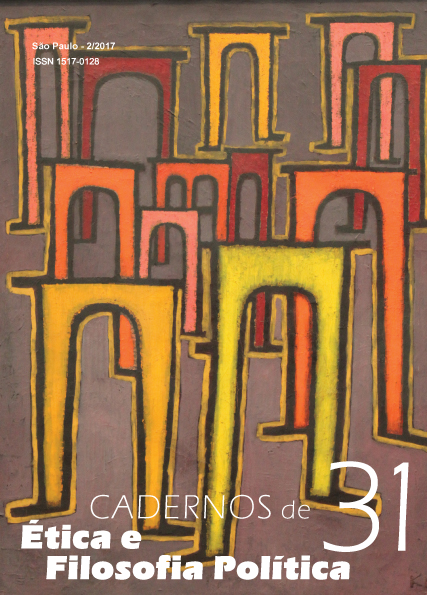The Ambivalence of politics in the Augustine’s prologue of the city of god
DOI:
https://doi.org/10.11606/issn.1517-0128.v2i31p49-62Keywords:
Politics, Morals, History, Eternity, WillAbstract
In the City of God’s prologue, Augustine shows an ambivalent conception of politics,because the politics acquires positivity or negativity according to the identity or contradiction of a civitas or res publica with itself. More precisely, the celestial city, which has two modes of existence, one in the history, other in the eternity, progressively conquers identity as in history succeeds a coherent process towards its genuine mode of existence, in eternity. On the other hand, the earthly city exists in the history in contradiction and conflict in becoming slave of its own libidinousness of dominance so that its history is one of a progressive damnation and lost of being. Therefore a city holds political statute in despite of its moral orientation or disorientation. Moreover, within the limits of the prologue, the Augustinian foundation of politics is neither the nature nor the reason.
Downloads
References
Fontes primárias:
AUGUSTINUS. De civitate dei (Libri I-X). Corpus Christianorum Series Latina XLVII. Turnhout: Brepols, 1955.
AUGUSTINUS. De civitate dei (Libri XI-XXII). Corpus Christianorum Series Latina XLVIII. Turnhout: Brepols, 1955.
AUGUSTINUS. Confessionum libri tredecim. Patrologia Latina Tomus 32. Turnhout: Brepols, 1992.
AUGUSTINUS. De libero arbitrio libri tres. Patrologia Latina Tomus 32. Turnhout: Brepols, 1992.
AUGUSTINUS. A cidade de Deus. (contra os pagãos). 2 volumes. Trad. Oscar Paes Leme. Petrópolis: Vozes, 2002.
CICERO. De re publica. Leipzig: Bibliotheca Scriptorum Graecorum et Romanorum Teubneriana, 1964.
Fontes secundárias:
ADAMS, J. D. “Augustine’s Definitions of Populus and the Value of Civil Society”. In: DONNELLY, D. F. The City of God - A Collection of Critical Essays. New York: PETER LANG, 1995, p. 171-182.
ADORNO, T. W. “Progresso”. Trad. Cohn, G. Lua Nova 27 (1992), p. 217-236.
ARCHAMBAULT, P. “The Ages of Man and the Ages of the World, A Study of two Traditions”, Revue des Études Augustiniennes 12 (1966), p. 193-228.
BREZZI, P. “Una civitas terrena spiritualis come ideale storico-politico di Sant’Agostino”, Augustinus Magister, II, Paris, 1954, p. 915-922.
CHAX-RUY, J. Saint Augustin – Temps et Histoire. Paris: Études Augustiniennes, 1956.
COOPER, R. H.; FERRARI, L. C. Concordantia in XXII libros De ciuitate Dei S. Aurelii Augustini. Hildesheim: Olms-Weidmann, 1999.
GILSON, É. Evolução da Cidade de Deus. São Paulo: Herder, 1965.
GILSON, É. Introdução ao estudo de santo Agostinho. Trad. Ayoub, C. N. A. São Paulo: Discurso Editorial; Paulus, 2006.
GÜNTHER, H. Le temps de l’histoire – Expérience du monde et catégories temporelles en philosophie de l’histoire de saint Augustin à Petrarque, de Dante à Rousseau. Paris: Éditions de la Maison des Sciences de l'Homme, 1996.
GUY, J-C. Unité et structure logique de la “Cité de Dieu”de saint Augustin. Paris: Études Augustiniennes, 1961.
HARTOG, F. A História – de Homero a santo Agostinho. Belo Horizonte: UFMG, 2001.
HEYKING, John von. Augustine and politics as longing in the world. Columbia: University of Missouri Press, 2001.
LIGOTA, C. “La foi historienne”, Revue des Études Augustiniennes, 43 (1997), p. 111-171.
MARKUS, R. A. Saeculum: History and Society in the Theology of St Augustine. Cambridge: Cambridge University Press, 1970.
MARROU, H-I. L’ambivalence du temps de l'histoire chez saint Augustin. Montréal-Paris: Vrin, 1950.
MARROU, H-I. “La théologie de l’histoire”, Augustinus Magister, III, Paris, 1954, p. 193-212.
MOHRMANN, C. “Saint Augustin écrivain”. In: Études sur le latin des Chrétiens, Tome II – Latin chrétien et médiéval. Roma: Edizioni di Storia e Letteratura, 1961.
MOMMSEN, TH. “St. Augustine and the Christian Idea of Progress”, Journal of the History of Ideas XII (1951), p. 346-374.
PARKER, Th.-M. “St. Augustine and the Conception of Unitary Sovereignty”, Augustinus Magister, II, Paris, 1954, p. 951-955.
SILVA FILHO, L. M. A definição de populus n’A cidade de Deus de Agostinho: uma controvérsia com Da república de Cícero. Dissertação de Mestrado em Filosofia, São Paulo, USP, 2008.
SILVA FILHO, L. M. Desnaturalização da política n’A cidade de Deus, de Agostinho. Tese de Doutorado em Filosofia, São Paulo, USP, 2012.
Downloads
Published
Issue
Section
License
Copyright (c) 2017 Luiz Marcos da Silva Filho

This work is licensed under a Creative Commons Attribution-ShareAlike 4.0 International License.


